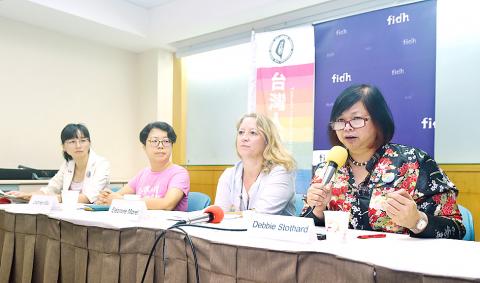The International Federation for Human Rights (FIDH) yesterday said that it would in October hold its 40th congress in Taipei, the first time the event is to be held in Asia in its nearly 100-year history.
Taiwan has been chosen due to the federation’s long-term rapport with Taiwanese human rights organizations and its concern over marriage equality, FIDH secretary-general Debbie Stothard said.
“When FIDH chooses the location of a congress, in addition to our strong relationship to our members who are in the country — in this case the Taiwan Association for Human Rights [TAHR] — we also consider whether we are here to congratulate the country on their progress on human rights and democracy, or whether we are here to push the state to behave better or to improve their position on human rights and democracy,” she told a news conference.

Photo: Liao Chen-huei, Taipei Times
“We very much hope that Taiwan can create history by passing the marriage equality bill tomorrow [today],” she said, adding that it decided to hold the congress in Taiwan from Oct. 21 to 25 in part due to the LGBT Pride Parade to be held on Oct. 26.
Hopefully, the bill would be enacted by the time the congress is held, she said.
She also expressed hope that the government would pass an asylum law, promote freedom of expression and assembly, and take effective steps to end the death penalty.
Politicians would be reluctant to promote change as elections near, “but let’s not forget that the very existence of Taiwan is an act of courage,” Stothard said.
“Please carry forward that courage into commitments to protect human rights and democracy in this country,” she added.
About 400 human rights advocates from more than 100 nations, along with international experts, local authorities and foreign guests, are expected to join the congress at the Grand Hotel to discuss growing threats to human rights and possible responses to such challenges, TAHR secretary-general Chiu Ee-lin (邱伊翎) said.
Legislative Speaker Su Jia-chyuan (蘇嘉全) and Minister of Foreign Affairs Joseph Wu (吳釗燮) have been invited to attend, she added.
The congress, held once every three years, is a great opportunity for human rights defenders from around the world to share their experiences, FIDH CEO Eleonore Morel said.
Issues on the agenda are to include climate change, digital technology, artificial intelligence, LGBT rights, women’s rights and Aboriginal communities, she said.
“The congress will be one of the largest human rights events that Taiwan has ever hosted and a great opportunity for its government and civil society to engage in a productive dialogue on global issues,” TAHR board member Wu Jia-zhen (吳佳臻) said.
It would be the perfect opportunity to reaffirm that human rights are universal and that civil society worldwide can work together to fight for common causes, she added.

A car bomb killed a senior Russian general in southern Moscow yesterday morning, the latest high-profile army figure to be blown up in a blast that came just hours after Russian and Ukrainian delegates held separate talks in Miami on a plan to end the war. Kyiv has not commented on the incident, but Russian investigators said they were probing whether the blast was “linked” to “Ukrainian special forces.” The attack was similar to other assassinations of generals and pro-war figures that have either been claimed, or are widely believed to have been orchestrated, by Ukraine. Russian Lieutenant General Fanil Sarvarov, 56, head

SAFETY FIRST: Double the number of police were deployed at the Taipei Marathon, while other cities released plans to bolster public event safety Authorities across Taiwan have stepped up security measures ahead of Christmas and New Year events, following a knife and smoke bomb attack in Taipei on Friday that left four people dead and 11 injured. In a bid to prevent potential copycat incidents, police deployments have been expanded for large gatherings, transport hubs, and other crowded public spaces, according to official statements from police and city authorities. Taipei Mayor Chiang Wan-an (蔣萬安) said the city has “comprehensively raised security readiness” in crowded areas, increased police deployments with armed officers, and intensified patrols during weekends and nighttime hours. For large-scale events, security checkpoints and explosives

PUBLIC SAFETY: The premier said that security would be tightened in transport hubs, while President Lai commended the public for their bravery The government is to deploy more police, including rapid response units, in crowded public areas to ensure a swift response to any threats, President William Lai (賴清德) said yesterday after a knife attack killed three people and injured 11 in Taipei the previous day. Lai made the remarks following a briefing by the National Police Agency on the progress of the investigation, saying that the attack underscored the importance of cooperation in public security between the central and local governments. The attack unfolded in the early evening on Friday around Taipei Main Station’s M7 exit and later near the Taipei MRT’s Zhongshan

REBUFFED: In response to Chinese criticism over recent arms sales, Washington urged Beijing to engage in meaningful dialogue instead of threats and intimidation Washington’s long-term commitment to Taiwan would not change, the US Department of State said yesterday, urging Beijing to stop pressuring Taiwan and engage in meaningful bilateral dialogues. The remarks came in response to a backlash from Beijing about Washington’s latest approval of arms sales to Taiwan. The US Defense Security Cooperation Agency said in a statement on Wednesday that the Taipei Economic and Cultural Representative Office in the US has asked to purchase an arms package, including Tactical Mission Network Software; AH-1W helicopter spare and repair parts; M109A7 self-propelled howitzers; HIMARS long range precision strike systems; tube-launched, optically tracked, wire-guided missiles; Javelin